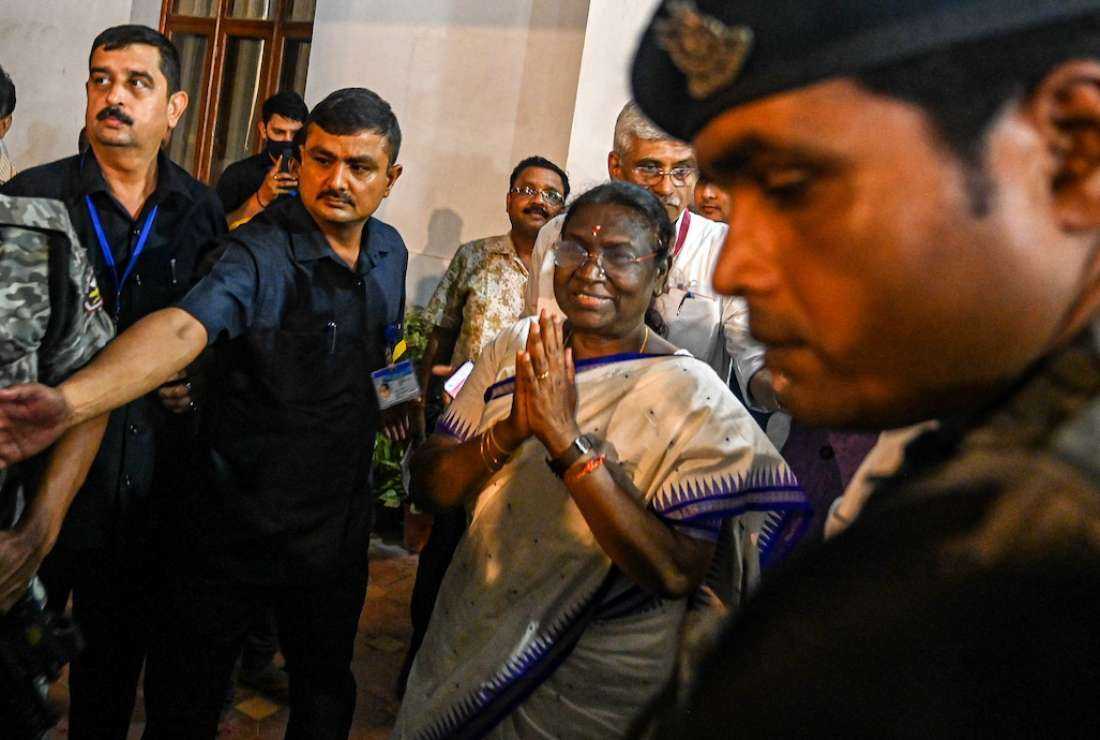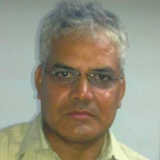Draupadi Murmu has never spoken for the indigenous rights of her people, who constitute 8.6 percent of the population

Prime Minister Narendra Modi tweeted on Thursday to congratulate Draupadi Murmu, India’s first indigenous woman to be elected president, saying her “record victory augurs well for our democracy.”
But not many, especially tribal rights activists, appear to be convinced. It is not as if they don’t feel good about her elevation. But they haven’t heard her speak for the rights of her lot. India has 104 million tribal people who constitute 8.6 percent of its population, according to a 2011 census.
It is true. Nobody has heard Murmu speak on any important issue, not even while crisscrossing the vast nation during her token presidential campaign after filing her nomination. Her election was a foregone conclusion given that she had the backing of the pro-Hindu Bharatiya Janata Party (BJP).
Indians do not directly elect their president. It is an ‘indirect’ election through an electoral college comprising members of parliament and the state legislative assemblies, most of which have the BJP in the majority.
Murmu, who will be sworn in on July 25 as the 15th president of the “Sovereign, Socialist, Secular, Democratic Republic” with a parliamentary system of government, will hopefully prove her critics wrong.
Murmu, who is the second woman to hold the coveted post, has several firsts to her credit. She is the first president born after independence and the youngest to occupy the post. She was also the first tribal woman to be sworn in as a provincial governor, in 2015, in eastern Jharkhand state.
The moot question on everyone’s mind is how this may improve the lives of India’s tribal people, who have been at the receiving end of the government’s policies for too long. Or is this elevation to the highest ceremonial post merely of symbolic value?
India has the largest tribal population in the world. But they are also the most marginalized section of its society, whose voice is not even heard.
More than seven decades after independence, the Indian state continues to treat its tribal people the same way as its colonial predecessors — the Noble Savage in urgent need of benign protection and development.
Tribal areas, which were marked out as excluded areas under colonial rule, continue to be grossly underdeveloped with governments offering a token “special development package,” which does little for them.
Yes, tribal people do have seats reserved for them in parliament and provincial legislatures, educational institutions and government jobs. In parliament 41 out of 543 elected seats are reserved for them.
India’s political class, secular or pro-Hindu, left or right, has been steadfast in its belief that its “development agenda” would “improve” the lot of India’s tribals. Ironically, tribal leaders have been willing partakers of this agenda, happy to be accommodated as ministers with insignificant portfolios or even less.
Hence, all eyes will be on Murmu when she takes office. Will she speak for tribal rights to their ancestral lands and natural resources — a constant source of conflict between indigenous people and government-backed corporates, who have a keen eye for the hidden minerals underneath them?
Whenever and wherever tribal people try and resist the political-corporate nexus, they are branded left-wing insurgents and either shot dead or arrested and left to die in prisons.
Will Murmu ever mention the martyrdom of Jesuit Father Stan Swamy, who devoted his entire life and died in prison for the cause of tribals in Jharkhand, where she was the governor?
Or does she believe that he was “a member of a banned Maoist group that routinely kills and massacres” government officials and civilians suspected of being police informers?
What is the new president’s stance on the issue of Hindu nationalist outfits aggressively targeting tribals who have converted to Christianity and compelling them to embrace Hinduism?
Yashwant Sinha, her opponent in the presidential race, while congratulating her hoped that she would not give in to “fear and favor” and would fulfill her responsibility as “custodian of the constitution.”
Echoing Sinha, West Bengal Chief Minister Mamata Banerjee, tweeted: “The country will sincerely look up to you as the head of state to protect the ideals of the constitution and be the custodian of our democracy, especially when the nation is plagued with so many dissensions.”
Otherwise, as many apprehend, this great moment in India’s history will only end up being of symbolic value for India’s indigenous or tribal communities.
Of course, Murmu and Modi will have ensured their place in history.
Political analysts say that by fielding Murmu, the prime minister and his ruling party will be the biggest beneficiaries, having extended their electoral outreach to the sizable tribal electorate spread across the country, especially in a dozen states in the western, central and eastern belt, as also the entire northeast, just in time for national elections scheduled for May 2024.
And, in case, and this is a remote possibility, if Modi and the BJP find themselves in a keen contest causing a return to the coalition government era marked by instability, they could always rely on the president.
Skeptics in the opposition parties have started to make their apprehensions known. Tejashwi Yadav, a young leader of Bihar’s Rashtriya Janata Dal (RJD), told a television reporter: “We don’t want a statue at Rashtrapati Bhavan [the official residence of India’s president].”
Professor Ganesh Devy, an academic activist dedicated to the cause of indigenous communities and their languages across the globe, says he is happy that a tribal woman has become president even if she is going to be nothing more than a “rubber stamp.”
A tribal woman occupying the top post will not change the lives of tribal people in India, he told me. “But it is really a good idea — a great idea indeed — in terms of tribal affairs, tribal welfare and tribal pride,” he said.
Maybe, he is right. Any tribal leader worth his salt will tell you off the record that it is simply impossible to raise your voice for tribal interests in today’s India.
The nation’s electoral system is all about raising funds for the political parties and those come from the corporations, the interests of whom run contrary to tribal people.
*The views expressed in this article are those of the author and do not necessarily reflect the official editorial position of UCA News.

